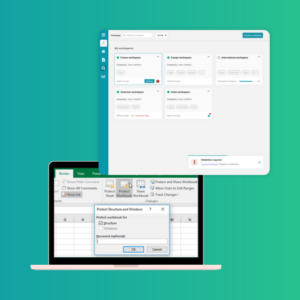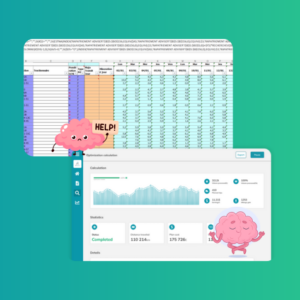
How to anticipate and optimize your transport needs during the summer period?

The summer period is often synonymous with additional challenges for carriers, shippers and principals. Early summer sales, summer vacations, days when HGVs are not allowed, roads congested with holidaymakers and preparations for the start of the new school year all add to the logistical complexity. To meet these challenges, it’s essential to anticipate and optimize your freight operations. Even if the summer period requires a certain amount of adaptation and anticipation, it’s not insurmountable, and Artificial Intelligence can help.
What are the main summer constraints facing transport and logistics companies?
- Anticipating sales, transporting seasonal products and the upcoming back-to-school season
Summer never comes alone. It brings with it a change of pace, diet and desires. Logistics and transport professionals know this particular tempo well, and are obliged to anticipate months in advance: the start of summer is synonymous with destocking, sales and other promotions, to make room for the following season. In Europe, sales traditionally start at the end of June and last until midsummer. But dates vary from one country to another. In 2023, Luxembourg opens the ball on June 22, followed by France on June 28, then Italy and Spain on July 1, before being replaced by Germany at the end of July.
In stores, the shelves are packed! School supplies make their comeback at the end of the year, for forward-thinking holidaymakers who anticipate their departure. School bag searches take off on the web as early as June 20.
 Volume of searches for the term “schoolbag” from 1/05/2022 to 15/10/2022 on Google, source Google Trends
Volume of searches for the term “schoolbag” from 1/05/2022 to 15/10/2022 on Google, source Google Trends
These items will be joined at the end of the summer by complementary equipment for home and office furnishings. Carriers and freight forwarders are directly affected by these variations. In summer, delivery locations change, as do the containers and contents transported. Refrigerated trucks are in greater demand, delivering food at the right temperature to holidaymakers, restaurants and supermarkets. In France, transporters’ usual destinations are migrating from the Paris region and other major cities, to more summery tourist areas. Every year, carriers and contractors have to anticipate and adapt to these seasonal changes.
- Coping with driver shortages, rising traffic and road constraints
Summer also means busy vacation routes and fewer staff available to carry out transport tasks. In order to best organize staff vacations, the summer period can run from mid-June to mid-September. That’s 12 weeks, which can be divided into 4 3-week periods. By balancing the number of vacations taken over these periods, ¼ of the workforce could be missing from each 3-week interval. One solution would be to rely on work-study students, who have just completed their training year. Recruited by the schools in September, they are trained and supported until the summer. This gives them just under a year to familiarize themselves with the sites, docks, processes and delivery methods. If they are well prepared, they will be in a position, come summer, to replace their colleagues and carry out journeys on their own. In this way, the summer period can be planned from the start of the school year for the following summer.
In addition to the summer staff shortage, there are other obstacles on the road. On the one hand, there’s the work on the roads usually used for commuting. These “working roads” are less overloaded in summer, which means that maintenance work is carried out. On the other hand, on weekends, holidaymakers pass through on overloaded transit routes. In France, for exemple, the state-run traffic forecasting organization “Bison Futé” has predicted difficult traffic conditions (varying from region to region) every Friday and Saturday in July and August, as well as on July 13 and 16, and every Sunday and Monday in August. To limit these kilometers of traffic jams, the French government has banned trucks weighing more than 7.5 tons from 7 a.m. to 7 p.m. on Saturdays from July 15, 2023 to August 26, 2023. These days are in addition to Sundays and public holidays, and must be taken into account in your transport plans. These constraints increase the pressure on carriers. The result is highly volatile out-of-contract rates, reinforced by persistent inflation.
How can AI prevent seasonal difficulties for carriers?
Certain factors are difficult to predict, such as price trends and construction zones. But tourist hotspots, carrier capacities and seasonal variations in demand remain fairly similar from one year to the next. Artificial intelligence can be a great help in assessing and estimating them.
- Anticipated transport requests
The transport market is governed by 3 major factors:
– seasonal demand
– annual supply
– market capacity
It is therefore necessary to build up stocks to meet specific needs, such as summer demand. It is also important to plan these specific deliveries on sufficiently precise dates, so as not to overload stores, or risk arriving too late and not being fresh enough or expected. The same applies to the back-to-school period, when sales of school supplies plummet in the second week of September.
So it’s important to make sure that the sequence is orchestrated correctly, and that your forecasts are sufficiently reliable to avoid false notes.
- Optimized schedules and transport routes
Transport planning is also an area in which false notes must be avoided, as they will impact on the timely delivery of products.
Finding the best routes, reducing journey times, fuel consumption and CO2 emissions, optimizing transport capacities, meeting deadlines and improving the customer experience: these are the major challenges for route optimization software. In the face of these challenges, the contributions of artificial intelligence-based solutions are key to simplifying planning.
These software programs can rely on algorithms, which compare numerous data, to propose the most relevant and least energy-intensive routes. They ensure optimized use of resources in real time, with the help of geolocation. These optimizations make all the more sense during the summer months. But they require the addition of specific data and criteria: days with traffic bans, exceptional events, work zones, planned vacations, emergency criteria, special vehicles, etc. And we’re never at the cutting edge. And there are always surprises!
Thanks to these calculations and simulations, it’s possible to program transport schedules that are as close as possible to summer needs and capacities.
Managing the transport of goods during the summer months presents very specific challenges, for carriers, shippers and principals alike. However, thanks to the use of artificial intelligence, it is possible to anticipate and optimize these operations. AI offers unparalleled possibilities for forecasting seasonal demand, planning resources, analyzing traffic conditions in real time, and making contracts more reliable. By investing in AI solutions tailored to your needs, you’ll be better prepared to face seasonal challenges, and you’ll have a clear advantage in the competitive freight transport sector.
Other articles

Excel or AI – the battle: which is the better solution for your transport plans ?
Learn more
Transportation planning: why Excel might not be the right tool for your organization ?
Learn more

